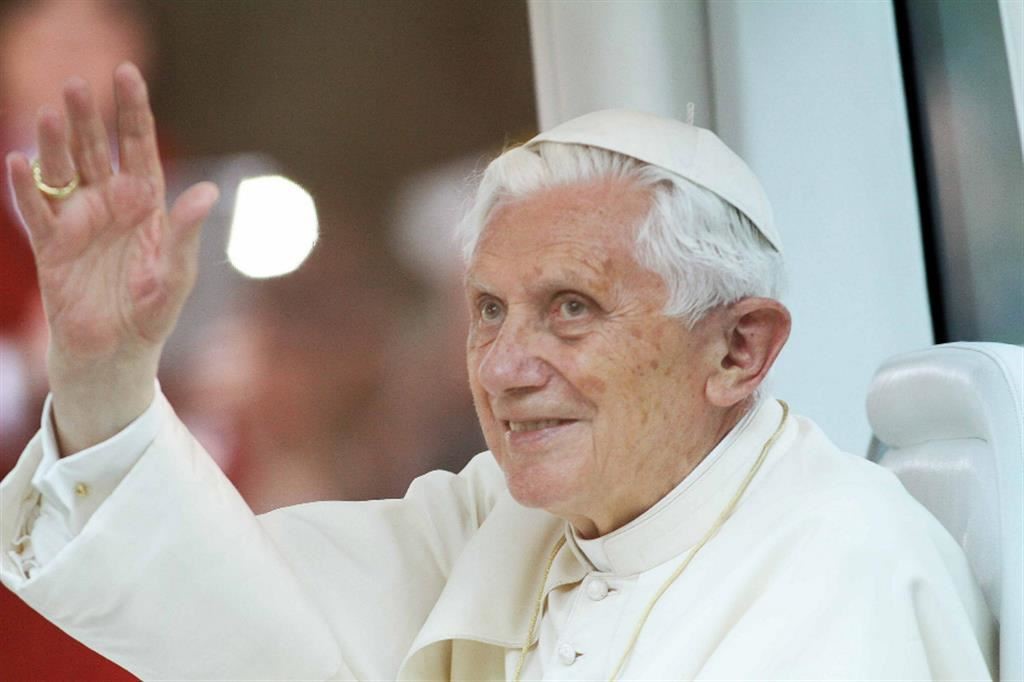
Today the funeral of Benedict XVI: his testimony of humility, dedication and truth is eternal
Benedict XVI passed away peacefully, closing his earthly day in prayer at 9.34 a.m. on 31 December 2022. The worsening of his health condition had been announced by Pope Francis at the end of the General Audience on Wednesday 28.
“According to the Argentine daily La Nacion, which cites sources close to the Pope Emeritus, his last words before dying would have been “Jesus I love you“, pronounced in German. Immediately after his last breath, again according to the newspaper, Archbishop Georg Gaenswein, Pope Ratzinger’s personal secretary, phoned Pope Francis to inform him. The Pontiff was the first to arrive, about ten minutes later, stopping in prayer before the body of Benedict XVI and imparting his blessing.
(Source: https://www.avvenire.it/).

Photo: www.vaticannews.va
Elected pope during the second day of the 2005 conclave, on the afternoon of 19 April, he chose the pontifical name Benedict XVI, in honour of Benedict XV, the «courageous and authentic prophet of peace». Perhaps he will be remembered above all for his revolutionary gesture on 11 February 2013 when he announced in Latin to the consistory his renunciation of the papal throne: “After having repeatedly examined my conscience before God, I have come to the certainty that my strengths, due to my advanced age, are no longer suited to adequately exercise the Petrine ministry.”

At the heart of his ministry Pope Ratzinger had placed the icon of the Good Shepherd from the very beginning: «One of the fundamental characteristics of the shepherd must be to love the men entrusted to him, just as he loves Christ, in whose service he is. ‘Shepherd my sheep,’ Christ says to Peter, and to me, at this moment. To shepherd means to love, and to love also means to be ready to suffer. » (Source: https://www.vatican.va)
Since time immemorial, the parable of the lost sheep (Luke 15:1-7) has represented Jesus’ concern for sinners and the mercy of God who does not resign himself to losing anyone. In this parable, the Church Fathers saw “an image of the mystery of Christ and the Church. Humanity – all of us – is the lost sheep who, in the wilderness, can no longer find the way. The Son of God does not tolerate this; He cannot abandon humanity in such a miserable condition. He leaps up, abandons the glory of heaven, to find the sheep and chase it to the cross. He carries it on His shoulders, He carries our humanity, He carries ourselves – He is the good shepherd, who lays down His life for the sheep.
[…] we are all carried by Christ. But at the same time he invites us to carry one another. […] The holy restlessness of Christ must animate the shepherd: for him it is not indifferent that so many people live in the desert. And there are many forms of desert. There is the desert of poverty, the desert of hunger and thirst, there is the desert of abandonment, of loneliness, of destroyed love. There is the desert of the obscurity of God, of the emptying of souls with no more consciousness of the dignity and journey of man.”

Photo: https://www.avvenire.it (Osservatore Romano)
To acknowledge, openly, one’s own weakness and inadequacy is one of the highest proofs of freedom, intelligence, humility and truth. We must be inspired by him today in the ongoing discernment of our mission to follow Jesus the Good Shepherd in the wake of the spiritual heritage of our founders. To give the best of ourselves in the existential peripheries – as our Congregation Leader Sr Joan urges us to do – we must interweave humility, vision, dedication to the poor, and the ability to cooperate and coexist with others.
“I AM ON MY WAY HOME”
So wrote Pope Emeritus Benedict XVI of himself in 2018: ‘In the slow fading of physical strength, inwardly I am on a pilgrimage towards Home…’. (Source: Corriere della Sera, 07/02/18). His earthly pilgrimage has already been a form of eternal life if we take on board what he confides in the second volume – the largest of the Jesus of Nazareth trilogy: ‘Eternal life is not an infinitely prolonged time but the authentic and meaningful life, the Greek kairos, the absolute instant of truth’ (cf. Claudio Magris in The Choice of Benedict. Investigation into the great renunciation)

